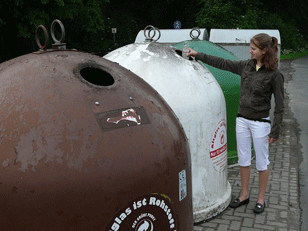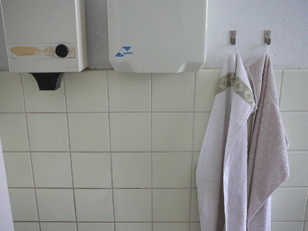Environmental Studies in Germany
 | | Since decades people in Germany are very much accustomed to the recycling of glass, paper and packages. | The rapid industrial development in Germany, especially by the end of the 19th century, caused severe environmental problems. As a reaction to this first ideas of nature conservancy were developed around 1900 by Ernst Rudorff. Environmental protection became a major political issue in Germany 70 years later. In 1971 the first Environmental Programme of the Federal Government was adopted, one year later the Waste Disposal Law (today: Act for Promoting Closed Substance Cycle Waste Management and Ensuring Environmentally Compatible Waste Disposal) and in 1974 the Federal Immission Control Act. (General information on air pollution control in Germany). Until 1986 environmental matters were dealt with by three different ministries within the Federal Government: the Ministry of the Interior, the Ministry of Agriculture and the Ministry of Health. On 6 June 1986 the Federal Ministry for the Environment, Nature Conservation and Nuclear Safety was established. Since then it has been responsible within the Federal Government for (lead-managing) national environmental policy. The IFAT (world’s biggest and most important trade fair for environmental technology and services) takes place in Munich, Germany. See report on the IFAT 2008.
2. Master Programmes related to environmental sciences and technology in Germany,
especially for foreign applicants and generally taught in English
Many courses are focusing on topics relevant to development processes. The DAAD will grant scholarships for some of these courses (details can be found in the DAAD scholarship data base)These courses are open to professionals and executives from developing countries and participants from industrialised countries planning a professional career in development co-operation. The typical participant from a developing country is a staff member of a public or private company. Thus he or she is involved in the planning and execution of projects with an emphasis on development policy. Cologne University of Applied Sciences The two-year postgraduate program "Technology and Resource Management in the Tropics and Subtropics" (M.Sc.) provides engineers, architects and natural scientists with additional subject-related know-how dealing with appropriate technologies in the tropics and the subtropics, as well as fundamental skills in resource management. The students set their focus (elective module) within the study plan as best fits their goals. Brandenburg University of Technology, Cottbus The Master’s Programme of the International Course of Study „Environmental and Resource Management“ comprises 4 semesters. One semester, preferable the third one, should be spent at one of the partner Universities abroad. Because of the different educational background of the applicants no mandatory classes are fixed. Each student compiles her/his own curriculum availing the consultancy of her/his individual mentor. Darmstadt University The Interdisciplinary Master Course 'International Cooperation and Urban Development' addresses the rapid urbanization process in countries of the South and looks at possibilities to prevent or alleviate the problems invariably associated with it. The Postgraduate Course “Tropical Hydrogeology, Engineering Geology and Environmental Management - TropHEE” is offered by the Faculty of Material- and Geosciences of the Darmstadt University of Technology. Technical University of Dresden M.Sc. Hydro Science and Engineering: The aim of the education is to be proficient in the knowledge area of water including its manifold different aspects to be prepared for the prospective challenges in research and practical work. Due to the limited resources for process water and drinking water in a lot of areas on nearly all continents as well as the devastating effects of hydrologic extremes like droughts, floods and the related erosion problems, the Study Course is mainly dedicated for interested student from developing countries. University of Flensburg Industrial Engineer (WirtschaftsingenieurIn) in Energy and Environmental Management, Sustainable Energy Systems and Management in Developing Countries University of Freiburg Masters Programme "Forest Ecology and Management": Based on a sound understanding of fundamental properties and processes of ecosystems, students of this MSc course will learn to assess, manage and monitor forests and other natural resources according to the principles of ecosystem management. Masters Programme "Environmental Governance" (MEG): Unique worldwide, the programmes focus is on analysing the ways of reconciling the manifold stakeholder interpretations of sustainable use of environmental resources and of facilitating the institutionalisation of context-effective environmental governance arrangements that combine market, state and civil society regulation modes across functional, sectoral and institutional boundaries for sustainable development. University of Hamburg-Harburg The International Master´s Programme Environmental Engineering is devoted to the study of the quality of the environment and to the technology of its conservation. It involves the basic education and training from civil engineering programs and chemical engineering, microbiology, hydrology and chemistry in order to broaden their perspective on potential solutions to environmental problems. Language of the program is primarily English. Some of the lectures are hold in German. As from October 2007, a new international Master programme in Environmental Studies is offered jointly by TUHH in Germany, Universität Autònoma de Barcelona in Spain, Universidade de Aveiro in Portugal and Aalborg Universitet in Denmark. This exclusive high-end programme requires students to study in at least two of the universities. Here also scholarships are available! University of Karlsruhe The international postgraduate course "Resources Engineering" provides multi-disciplinary and professional training in planning and management of sustainable development and utilisation of water and land resources with particular reference to developing countries. It has components in applied natural sciences, advanced and appropriate technology, socio-economics, and management. University of Kiel The Master of Science (M.Sc.) degree programme in Coastal Geosciences and Engineering is a postgraduate program which lasts approximately 18 months. The program is aimed to students from abroad and from Germany and completely taught in English. M.Sc. "Environmental Management": Graduates will be skilled to devise integrative management solutions for complex environmental issues on a regional, national and international level, for the private as well as for the public sector. Magdeburg University of Applied Sciences M.Sc. in Ecological Engineering (Ingenieurökologie):The programme is focussing on the evaluation of environmental resources, especially of water resources, but also dealing with management aspects. Renewable energy actually is coming to the fore because of the rural surroundings of the city of Magdeburg. Due to the small groups of students an individual mentoring is possible.
Admission requirements: B.Sc., B.Eng.; TOEFL (minimum 550 pts - paper based test or equivalent); basic German (can be upgraded locally; exams, thesis and lecture notes in English) University of Oldenburg Postgraduate Programme Renewable Energy (PPRE): An MSc programme of 16 months (3 terms) designed for scientists and engineers intending to prepare for a professional career in the field of renewable energy.See also: European Master in Renewable Energy’ - programme, which is organised by the European Renewable Energy Centres Agency (EUREC), Brussels, Belgium. University of Stuttgart The Master's Program Infrastructure Planning emphasises an interdisciplinary, integrated approach to planning and deals with problems especially relevant to developing countries. Graduates of the program work in high positions, shaping development all over the world. Environmental and Process Engineering called “Air Quality Control, Solid Waste and Waste Water Process Engineering” (WASTE).
Water Resources Engineering and Management (WAREM)
Course language is English but German language classes are part of the programmes. University of Trier Master of Science Programme: Environmental Assessment, Technology and Management. The programme consists of required courses in four subject areas: Environmental Assessment, Environmental Law and Standards, Environmental Technology and Environmentally Compatible Techniques and Environmental Management and Development Strategies
Bauhaus-University Weimar Master Programme “Master Study Course Advanced Urbanism (AdUrb) In January 2007 a new certified online-course (M.Sc.) "Environmental Engineering and Management", in co-operation with the Asian Institute of Technology (Thailand) and the University of Leeds (UK), has been launched. Depending on the individual workload the course can take 2 - 4 years. (See also Master-Programmes for International Development Collaboration listed by the Association of German Postgraduate Studies and DAAD - International Degree Programmes!) The DAAD supports a range of postgraduate courses at German universities which aim at providing academically trained young professionals from developing countries with the opportunity of further specialised studies. The DAAD supports these selected programmes with a certain quota of scholarships and with financial assistance for a special tutoring system. See details and brochure.
3. Ph.D. Studies
see: DAAD - International Degree Programmes!)
4. Technology Transfer
KNOTEN WEIMAR, the International Transfer Centre Environmental Technology has the following fields of expertise: - Waste management
- Water management
- Air pollution control
- Infrastructure
| 

